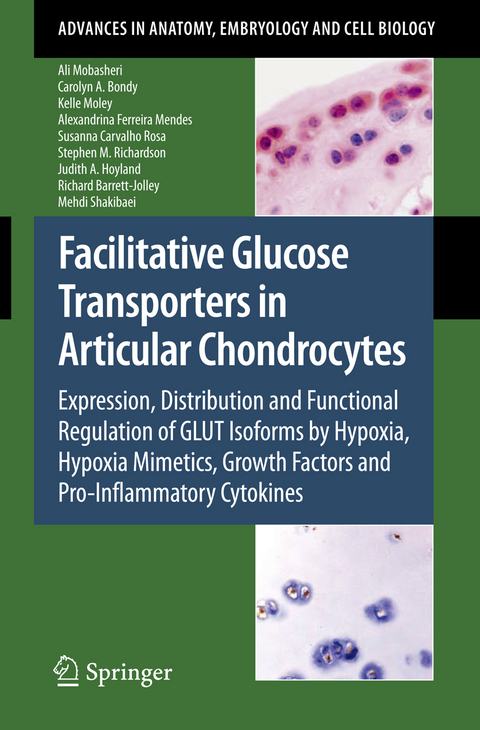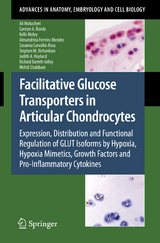Facilitative Glucose Transporters in Articular Chondrocytes
Expression, Distribution and Functional Regulation of GLUT Isoforms by Hypoxia, Hypoxia Mimetics, Growth Factors and Pro-Inflammatory Cytokines
Seiten
2008
|
2008
Springer Berlin (Verlag)
978-3-540-78898-0 (ISBN)
Springer Berlin (Verlag)
978-3-540-78898-0 (ISBN)
Articular cartilage is a highly specialized avascular connective tissue. This multidisciplinary article reviews the molecular and morphological aspects of GLUT expression and function in chondrocytes and their mesenchymal and embryonic stem cell precursors.
1 Introduction The provision of nutrients and oxygen to synovial joints is essential for the ph ysiological and load-bearing functions of articular cartilage and the hom- static control of metabolism within chondrocytes, its resident cells (Mobasheri et al. 2002c; Mobasheri et al. 2006). The transport of nutrients (i. e. , glucose, other h- ose and pentose sugars, amino acids, nucleotides, nucleosides and water soluble vitamins such as vitamin C) into articular chondrocytes is essential for the synt- sis of collagens, proteoglycans, and glycosaminoglycans by chondrocytes (Clark et al. 2002; Goggs et al. 2005; McNulty et al. 2005; Mobasheri et al. 2002a). There are numerous biological mechanisms by which nutritional factors might be expected to exert favorable influences on cartilage function and pathophysiological events in disease processes including osteoarthritis (McAlindon 2006). A decade ago, very l- tle was known about nutrient transport in chondrocytes, particularly the transport of glucose, related sugars, and water-soluble vitamins, which are essential for the synthesis of glycosaminoglycans by chondrocytes. Glucose is a crucial nutrient for cartilage function in vivo as it is for many other tissues and organs. However, it has always been assumed that glucose is important for the in vitro cultivation of chond- cytes, ex vivo maintenance of cartilage explants, and cartilage tissue engineering procedures.
1 Introduction The provision of nutrients and oxygen to synovial joints is essential for the ph ysiological and load-bearing functions of articular cartilage and the hom- static control of metabolism within chondrocytes, its resident cells (Mobasheri et al. 2002c; Mobasheri et al. 2006). The transport of nutrients (i. e. , glucose, other h- ose and pentose sugars, amino acids, nucleotides, nucleosides and water soluble vitamins such as vitamin C) into articular chondrocytes is essential for the synt- sis of collagens, proteoglycans, and glycosaminoglycans by chondrocytes (Clark et al. 2002; Goggs et al. 2005; McNulty et al. 2005; Mobasheri et al. 2002a). There are numerous biological mechanisms by which nutritional factors might be expected to exert favorable influences on cartilage function and pathophysiological events in disease processes including osteoarthritis (McAlindon 2006). A decade ago, very l- tle was known about nutrient transport in chondrocytes, particularly the transport of glucose, related sugars, and water-soluble vitamins, which are essential for the synthesis of glycosaminoglycans by chondrocytes. Glucose is a crucial nutrient for cartilage function in vivo as it is for many other tissues and organs. However, it has always been assumed that glucose is important for the in vitro cultivation of chond- cytes, ex vivo maintenance of cartilage explants, and cartilage tissue engineering procedures.
Articular Cartilage: Structure, Function, and Pathophysiology.- Does Arthritis Have a Nutritional Etiology?.- Metabolic Dysfunction in Arthritis.- Glucose: An Essential Metabolite and Structural Precursor for Articular Cartilage.- Mammalian Sugar Transporter Families: GLUT and SGLT.- Molecular Diversity of Facilitative Glucose Transporters in Articular Chondrocytes.- Regulation of Glucose Transport by Nonsteroidal Anti-inflammatory Drugs.- Glucose Transporters in the Intervertebral Disc.- Glucose Transporter Expression and Regulation in Embryonic and Mesenchymal Stem Cells.- Concluding Remarks.
| Erscheint lt. Verlag | 12.9.2008 |
|---|---|
| Reihe/Serie | Advances in Anatomy, Embryology and Cell Biology |
| Zusatzinfo | VII, 88 p. |
| Verlagsort | Berlin |
| Sprache | englisch |
| Maße | 155 x 235 mm |
| Gewicht | 166 g |
| Themenwelt | Medizinische Fachgebiete ► Chirurgie ► Unfallchirurgie / Orthopädie |
| Medizinische Fachgebiete ► Innere Medizin ► Endokrinologie | |
| Medizin / Pharmazie ► Studium | |
| Schlagworte | Articular Cartilage • chondrocyte • chondrogenesis • embryonic stem cell • glucose transporter • Hardcover, Softcover / Medizin/Nichtklinische Fächer • HC/Medizin/Nichtklinische Fächer • mesenchymal stem cell • Osteoarthritis • oxygen-regulated transcription factor • proteins • Regulation |
| ISBN-10 | 3-540-78898-0 / 3540788980 |
| ISBN-13 | 978-3-540-78898-0 / 9783540788980 |
| Zustand | Neuware |
| Haben Sie eine Frage zum Produkt? |
Mehr entdecken
aus dem Bereich
aus dem Bereich
Buch | Softcover (2023)
Urban & Fischer in Elsevier (Verlag)
CHF 85,40
für Studium und Praxis unter Berücksichtigung des …
Buch | Softcover (2022)
Medizinische Vlgs- u. Inform.-Dienste (Verlag)
CHF 39,20




